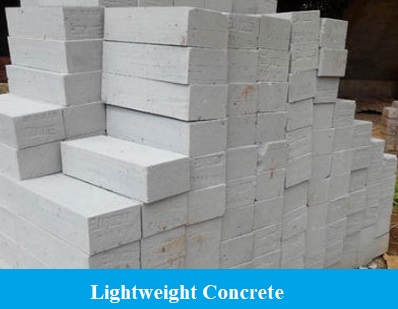Lightweight concrete is a special type of concrete made of lightweight coarse aggregate. Sometimes lightweight fine aggregate is used instead of lightweight coarse aggregate. The density of lightweight concrete is 1440 to 1840 kg/m³.

Lightweight concrete is made by using lightweight aggregates or low-density materials such as volcanic pumice, clay, slate, shale, scoria, tuff.
If the density of concrete is less than 2200 kg/m3, it is considered lightweight concrete. The density of standard concrete is 2300-2400 kg/m3.
Lightweight concrete can be characterized as a sort of concrete that incorporates an expanding agent in that it enhances the volume of the concrete mixture while giving extra characteristics like nailbility and reducing the dead load. It is lighter than traditional concrete. The utilization of lightweight concrete has been generally spread across nations like the USA and Gulf Countries.
The low density of the lightweight concrete reduced the dead load on the structure. Lightweight concrete is also thermal and fire-resistant. Lightweight concrete is cheap, easy to handle, and easy to transport.
Lightweight concrete keeps up its large voids does not form a laitance layer. An adequate water-cement ratio is fundamental to delivering sufficient adequate cohesion between cement and water. A low water-cement ratio can cause a lack of cohesion between particles, hence a loss in the strength of concrete. Moreover, a lot of water can make the concrete runoff aggregate shape.
Table of Contents
Properties:
- Aggregate used in the lightweight concrete should be a cubical, rounded, angular, or irregular shape.
- It has smooth skins to very irregular surfaces with large exposed pores.
- The texture and shape of the particle directly affect the workability of lightweight concrete.
- Permeability is lower than traditional concrete.
Uses of Lightweight Concrete:
- A lightweight concrete block is used to make partition walls.
- It is used as a concrete screed.
- It is used as heat insulation on the roof.
- It is used for insulating the water pipes.
Advantages:
- Due to the low-density dead load on the structure is very low.
- It enhances the thermal property of the building.
- They are fire-resistant.
- They are cheap compared to conventional concrete blocks.
- It is easy to handle and transport.
